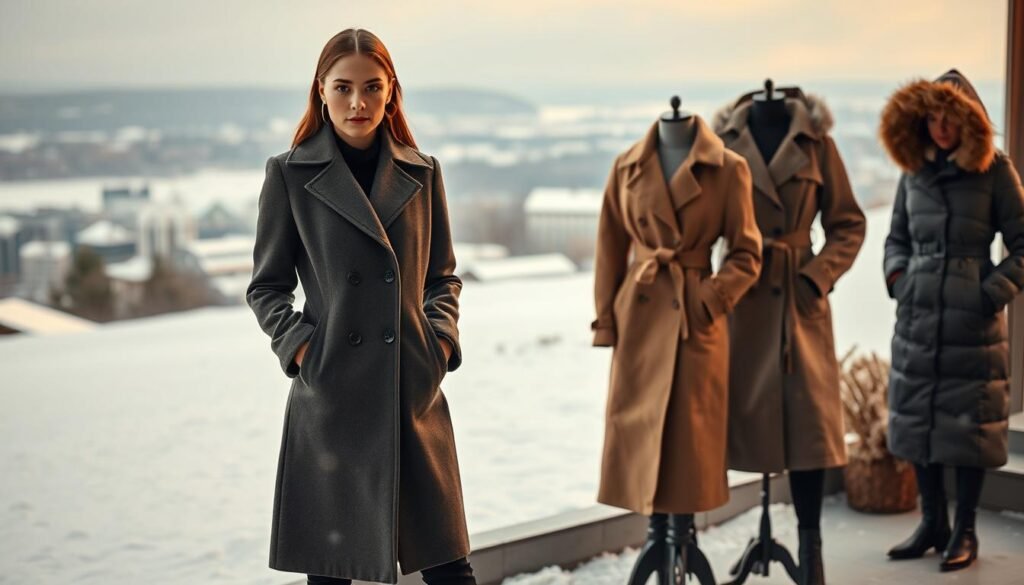“Fashion is not something that exists in dresses only. Fashion is in the sky, in the street, fashion has to do with ideas, the way we live, what is happening,” said Coco Chanel. This wisdom is key when picking winter coats that must be both warm and stylish.
Your outerwear is the highlight of your wardrobe in the cold months. It’s the first thing people notice and often the last thing you remove. Yet, many settle for practical jackets that don’t match their outfits.
Stylish coats show that warmth and style can go hand in hand. The right coat can turn any look from basic to breathtaking. Elegant outerwear is both a shield and a bold statement.
Choosing the right fashion coats means investing in pieces that boost your confidence, no matter the weather. Your jacket should highlight your style, not hide it.
Key Takeaways
- Your outerwear is the most visible part of your outfit during cold weather months
- The right coat balances both warmth and personal style without compromise
- Quality outerwear serves as an investment piece that elevates any outfit
- Choosing function over fashion creates missed opportunities for style expression
- Well-selected coats boost confidence while providing essential weather protection
- Your jacket should complement, not clash with, your carefully planned looks
Understanding Your Winter Coat Styling Needs
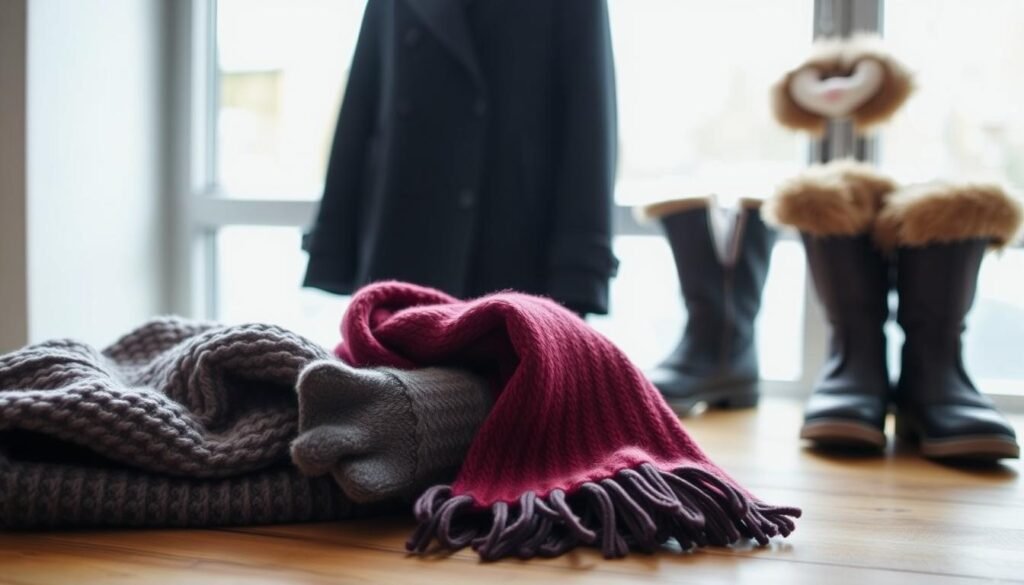
To create a good cold weather styling plan, you need to know your environment, activities, and what you like. This step helps you choose wisely, blending function with fashion.
Your coat should match your climate and lifestyle. Without this, you might pick something stylish but not practical.
Assessing Your Climate and Daily Activities
Climate affects your warm fashion choices. In California, a light trench coat might be enough. But in the northeast, you’ll need a puffer coat for warmth and style.
Think about your daily life. Do you walk a lot or move between warm places? This decides if you need a thick coat or something lighter.
Identifying Your Personal Style Goals
Your coat should complement your wardrobe, not clash with it. Do you like simple styles or statement pieces that show your personality?
Good winter wardrobe planning mixes practicality with style. This way, you’ll wear your coats often.
Setting Your Budget and Investment Priorities
Invest in quality materials like wool and cashmere. They last longer and look better, making them worth the extra cost.
| Price Range | Material Quality | Expected Lifespan | Best For |
|---|---|---|---|
| $100-200 | Synthetic blends | 2-3 seasons | Occasional wear |
| $200-500 | Wool blends | 5-7 seasons | Regular use |
| $500+ | Pure wool/cashmere | 10+ seasons | Daily investment piece |
Choose versatile pieces for different occasions. This way, you get the most value and a cohesive wardrobe.
How to Choose the Right Winter Coats for Your Wardrobe
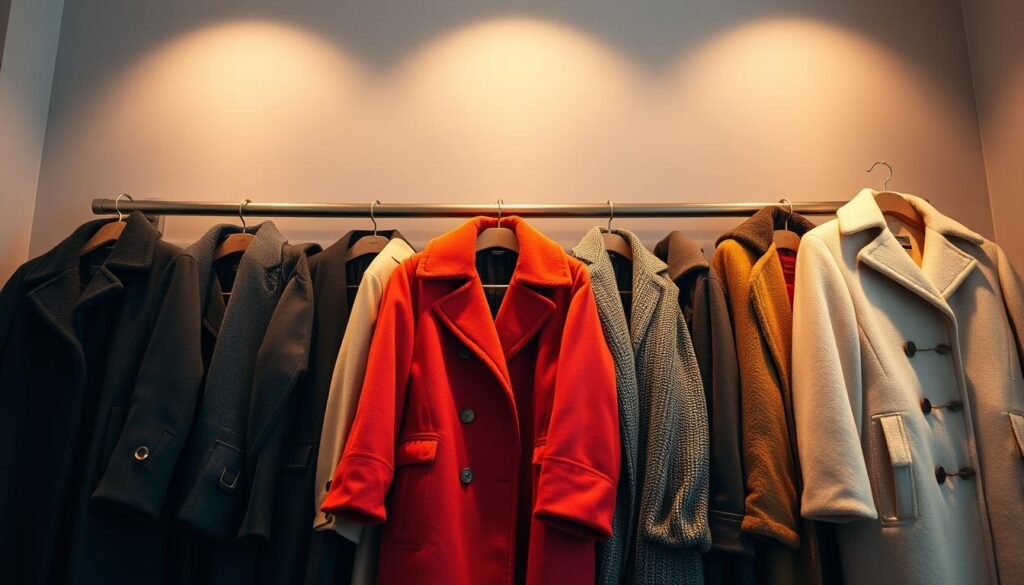
Starting a winter wardrobe means picking coats that fit your lifestyle and climate. The right coat types keep you warm and stylish during the cold months.
Knowing the benefits of each coat style helps you make good choices. Different winter coats are made for different weather and needs.
Classic Wool Overcoats for Timeless Elegance
Wool coats are the top choice for stylish outerwear. They look great for work or a night out. Wool keeps you warm and looks polished.
Investing in a wool overcoat is wise. It lasts long and goes with jeans or suits. This makes it a versatile wardrobe staple.
Insulated Puffer Jackets for Maximum Warmth
Modern puffer jackets are warm and stylish. Their design traps air well, keeping you warm outside. They’re perfect for cold weather.
Today’s puffer jackets are more than just warm. They have sleek designs and quality materials. They’re great for city life.
Versatile Trench Coats for Transitional Seasons
Trench coats are great for rainy days and mild weather. They’re stylish and keep you dry. They’re perfect for spring and early winter.
These versatile pieces are good for work or casual days. They offer value all year round.
Heavy-Duty Parkas for Extreme Weather
Parkas are the best for very cold weather. They have down insulation, waterproof shells, and fur-lined hoods. They’re essential for extreme cold.
Modern parkas are warm and stylish. They ensure you stay warm and look good in extreme weather.
Selecting Flattering Coat Styles for Your Body Type
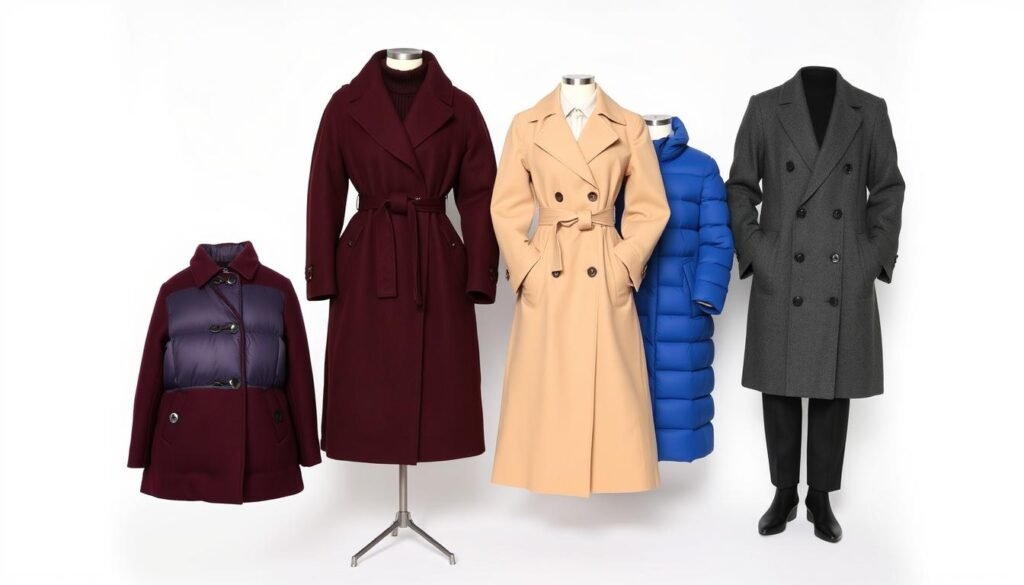
Knowing how coat cuts fit your body is key to looking good in warm fashion. The right coat should highlight your best features and keep you warm. Body type styling is critical in winter, as layering can either look great or add bulk.
Finding the Perfect Fit and Silhouette
Start with the shoulders for a good coat fit. They should sit flat without pulling. Make sure armholes are roomy for movement without extra fabric.
Sleeves should reach your wrist bone when your arms are relaxed. Wrap coats are great for defining your waist. They’re perfect for those who want to show off their waistline while staying warm. You can adjust the belt to fit your needs all season.
Choosing Optimal Length and Proportions
Car coats look good with knee-length dresses but need thought with midi-lengths. The length of your coat and dress should match. Flattering coats keep your upper and lower body in balance.
Long coats are elegant but might overwhelm petite frames. Mid-length coats are versatile and cover well. Think about your daily activities when picking a coat length, as longer ones might not be practical for active people.
Understanding How Different Cuts Enhance Your Shape
Structured shoulders are good for narrow frames, while soft cuts suit broader shoulders. A-line coats skim your body, making them flattering for everyone. Warm fashion works best when cut and fit match well.
The belt’s position affects your look. Higher belts make legs look longer, while waist belts show off your curves. It’s all about finding the right coat fit for your body.
Mastering Strategic Layering Techniques
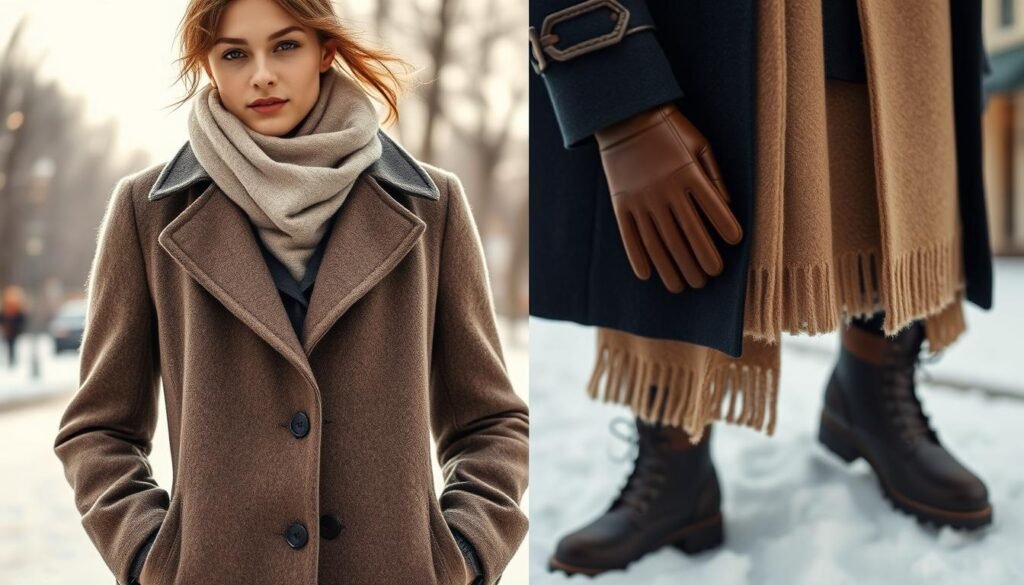
Strategic layering turns winter dressing into an art that blends comfort with style. It’s all about how different clothes work together for warmth and looks. When done right, layering techniques let you change your outfit all day while staying stylish.
Building Effective Base Layers
Your base layer is the base of any good winter outfit. Pick fabrics like merino wool or synthetic blends that keep you dry. These materials stop the clammy feeling cotton gives when moving between warm and cold places.
How it fits is key. Your base layer should feel like a second skin but not be too tight. Avoid loose or baggy undergarments that add bulk. Good base layers make your winter coats look better and keep you looking streamlined.
Adding Insulating Mid-Layers
Mid-layers add most of your warmth and offer styling chances. Light sweaters, cardigans, and vests are great under coats. Pick pieces that match your outer layer without stealing the show.
Think about the weight and thickness of your mid-layer. A thick sweater works with a big coat but might be too much under a slim blazer. Warm clothing can be stylish if you choose the right textures and weights.
| Mid-Layer Type | Best Coat Pairing | Warmth Level | Style Factor |
|---|---|---|---|
| Thin Cashmere Sweater | Tailored Wool Coat | Medium | Elegant |
| Chunky Knit Cardigan | Oversized Puffer | High | Casual |
| Quilted Vest | Trench Coat | Medium | Versatile |
| Fleece Pullover | Heavy Parka | High | Sporty |
Balancing Warmth with Style
The biggest challenge in winter dressing is staying warm without losing your style. Focus on the right proportions and shapes that flatter your body and keep you warm.
“The art of dressing well in winter is about creating harmony between function and fashion, not choosing one over the other.”
Smart layering techniques let you adjust your outfit as the day goes on. This keeps you comfy and looking good from work to social events.
Avoiding Common Layering Mistakes
Many people make bulk by mixing wrong fabric weights or textures. Don’t pair stiff, thick materials together. Instead, mix thin and thick layers smartly.
Another mistake is ignoring color matching between layers. Make sure your visible layers go well together, even when you take off your coat indoors.
Creating Cohesive Color Schemes and Patterns
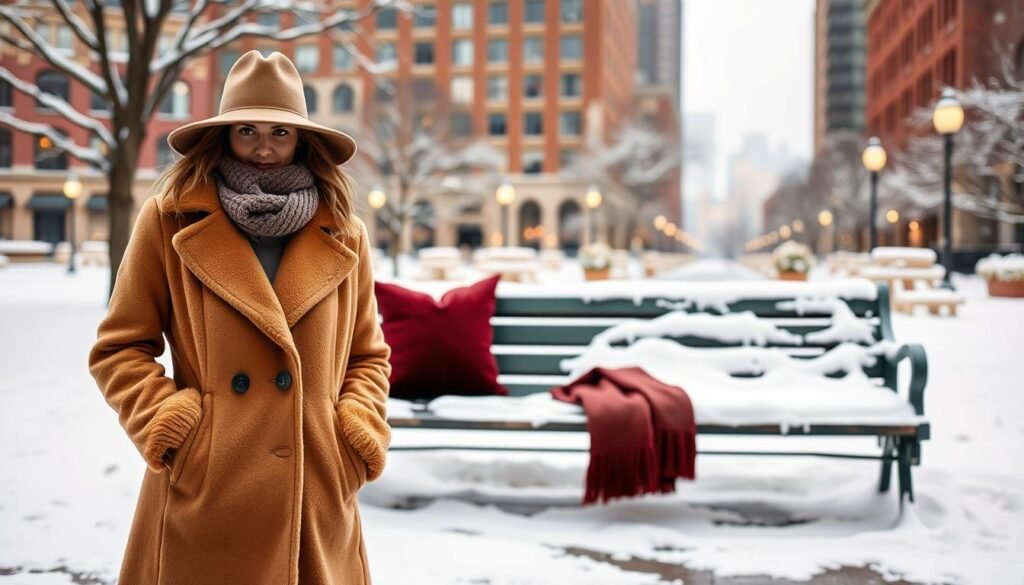
Creating a harmonious color palette makes your stylish coats match every outfit perfectly. Smart color coordination turns winter dressing into a simple, stylish process.
Building Around Neutral Foundation Pieces
Neutral shades like black, navy, camel, and gray coats are key for versatile winter wardrobes. They go well with almost any outfit. These colors are always in style, making them a smart choice.
Ivory and cream add elegance without being too bold. They’re great for adding a touch of brightness to winter outfits without losing sophistication.
Incorporating Seasonal Colors Effectively
Adding seasonal colors can spice up your cold weather styling. Deep jewel tones like emerald, burgundy, and sapphire add depth to winter looks. They’re also professional enough for work.
Use festive colors as accents, not main pieces. Try colorful scarves, gloves, or handbags to add flair to neutral coats for special events.
Mixing Textures and Patterns with Confidence
Combining textures adds interest without clashing. Wool and chunky knits look great together. Leather accessories add a sleek touch to both structured and flowing fabrics in winter fashion.
When mixing patterns, start with one bold pattern and add subtle textures. Or, pair patterns of different sizes, like small checks with large plaids, for a stylish look.
| Coat Color | Best Accent Colors | Complementary Textures | Pattern Pairing |
|---|---|---|---|
| Black | White, Gray, Gold | Cashmere, Leather | Subtle Prints |
| Navy | Cream, Burgundy, Silver | Wool, Silk | Stripes, Plaids |
| Camel | Brown, Ivory, Rust | Suede, Knits | Tweeds, Solids |
| Gray | Pink, Blue, Yellow | Fur, Cotton | Geometric, Florals |
Styling Winter Coats for Professional Environments
Choosing the right winter coat for work is key. It’s about looking good while staying warm. Pick coats that make you look professional and keep you cozy on cold days.
Your coat says a lot about you at work. Smart winter coat selection keeps you looking good and feeling comfortable all day.
Office-Appropriate Coat Styles
Wool overcoats are top picks for work. They look timeless sophisticated with suits or casual outfits.
Car coats are great for less formal places. They’re short and neat, perfect with dress pants and blazers. Avoid oversized puffer jackets in formal settings, as they’re too casual.
Maintaining Professional Appearance Standards
Choose coats that keep you looking sharp in bad weather. Look for ones with water-repellent treatments to avoid stains.
Colors matter too. Stick to navy, charcoal, black, and camel. These colors are professional and hide stains well.
Transitioning Seamlessly from Commute to Workplace
Layering is smart for changing temperatures. Look for coats with removable linings and adjustable parts. This way, you can adjust your warmth without losing your professional look.
| Coat Style | Best For | Professional Level | Versatility |
|---|---|---|---|
| Wool Overcoat | Formal offices | Highest | Business only |
| Car Coat | Business casual | High | Work and weekend |
| Trench Coat | Creative industries | Medium-High | Multi-occasion |
| Wool Blend Peacoat | Casual offices | Medium | Very versatile |
Think about where you’ll store your coat at work. Designated coat closets or quality hangers keep your coat looking good all day.
Achieving Effortless Casual Weekend Looks
Weekend styling turns winter coats into comfy yet stylish outfits for any casual event. It’s all about picking pieces that feel as good as they look. Smart weekend styling keeps you warm and fashionable, even on relaxed days.
Balancing Comfort with Style
Getting the right mix of comfort and style starts with the right fit and fabric. Teddy bear coats are super cozy and stylish for weekend brunches and shopping. They keep you warm without losing visual appeal.
Choose coats that let you move freely and don’t get in the way. The best weekend pieces should feel like a warm hug but look put-together. Proper fit is key, even for casual looks.
Integrating Athletic and Leisure Elements
Puffer jackets make sporty yet stylish weekend outfits for outdoor fun. They mix athletic features with modern style. Look for designs with clean lines and smart colors.
Layer athletic pieces carefully to avoid looking too casual. Pair sleek puffer jackets with fitted jeans and good shoes. This keeps the sporty vibe while dressing up your look.
Creating Family-Friendly Outfit Combinations
For family activities, pick winter coats that are both practical and stylish. Choose ones that don’t wrinkle and are easy to clean. Durability and style should go hand in hand.
Look for coats with useful features like secure pockets and adjustable parts. Success in weekend styling means finding outfits that look great in family photos and handle busy days well.
Elevating Evening and Special Occasion Outfits
When formal events come up, your winter coat is key to looking refined. The right formal outerwear can turn any outfit into a showstopper. Your coat should complement your evening wear without taking over.
Sophisticated Coat Options for Formal Events
Elegant winter coats for special occasions have sleek cuts and luxurious fabrics. Wool cashmere blends are warm and stylish. Look for coats with clean lines that match formal shapes.
Classic wrap coats are great over cocktail dresses. Double-breasted styles add shape to flowing gowns. Choose colors like deep navy, rich burgundy, or timeless black for versatility.
Seamless Day-to-Night Transitions
Stylish coats make it easy to go from day to night. A tailored wool coat over a simple dress can be transformed with the right accessories. Swap your day bag for an elegant clutch and add statement jewelry.
Consider reversible coats for two looks in one. One side might have subtle texture for day wear. The other could have silk lining or metallic accents for evening.
“The perfect evening coat should make you feel confident from the moment you put it on until the last dance of the night.”
Statement Pieces and Luxury Details
Fur-trimmed collars and cuffs add glamour to formal outerwear. Velvet accents add rich texture against winter’s cold. Subtle embellishments like covered buttons or decorative stitching make simple designs pop.
Bold colors make a big statement at special events. Emerald green or sapphire blue coats grab attention. Balance bold outerwear with simple accessories to keep things sophisticated.
Completing Your Look with Strategic Accessories
The right accessories can make any winter coat stand out. Strategic accessory choices help create looks that show off your style and keep you warm. Each piece should add both function and flair to your coat.
Coordinating Scarves, Hats, and Gloves
Choosing the right colors for your winter accessories is key. Pick pieces that complement your coat, not match it exactly. For example, a charcoal wool coat looks great with cream accessories, while camel coats pair well with burgundy or navy.
Mixing textures adds interest to your outfit. Try leather gloves with chunky knit scarves or sleek cashmere hats with wool mittens. This adds depth without overwhelming your look.
Selecting Complementary Handbags and Footwear
Your bag and shoes can make or break your winter look. Structured handbags go well with tailored coats, while slouchy totes suit casual puffer jackets. Make sure your accessories can handle the cold.
Choose boots that match your coat’s length. Knee-high boots are perfect with shorter coats, while ankle boots suit longer ones. This balances your look and flatters your figure.
Adding Personality Through Thoughtful Details
Small details can make a big difference in your winter style. Try statement brooches, colorful pocket squares, or unique buttons to add a personal touch to your coat.
| Coat Style | Best Accessories | Personality Touch |
|---|---|---|
| Wool Overcoat | Silk scarves, leather gloves | Vintage brooch |
| Puffer Jacket | Knit beanies, fleece mittens | Fun patches |
| Trench Coat | Lightweight scarves, pumps | Belt upgrade |
“Accessories are like vitamins to fashion—as such, you should use them liberally as such.”
Remember, less is more when it comes to accessories. Pick two to three key pieces that work well together. Avoid over-accessorizing to keep your coat looking balanced.
Maintaining and Caring for Your Investment Pieces
Keeping your premium outerwear in top shape starts with knowing how to care for it. Quality outerwear can last for decades if you take good care of it. How you maintain your garments affects their look and lifespan.
Proper Storage and Seasonal Care
Hang your winter coats on sturdy wooden hangers to keep them in shape. Use cedar closets or garment bags to protect against moths and moisture.
Clean your coats before storing them to avoid stains. Empty pockets and make sure zippers are half closed. Keep them in a cool, dry place when not in use.
Professional Cleaning Guidelines
Wool and cashmere coats need professional dry cleaning every season. Choose cleaners who know how to handle luxury fabrics and follow coat care guidelines.
Tell your cleaner about any stains or concerns. Ask for gentle pressing to avoid damaging delicate materials.
Long-Term Protection Strategies
Wear different coats to spread out the wear and tear. Use fabric protectors before the season starts to keep them weather-resistant.
Fix small repairs right away to avoid bigger problems. Get professional alterations to keep your coat fitting well as your body changes.
| Fabric Type | Cleaning Frequency | Storage Method | Special Care Notes |
|---|---|---|---|
| Wool | End of season | Cedar closet | Professional pressing only |
| Cashmere | After 3-4 wears | Breathable garment bag | Gentle specialist required |
| Down/Synthetic | Twice per season | Hanging with space | Machine washable options |
| Leather | Professional annually | Climate controlled | Conditioning treatments needed |
Proper garment maintenance keeps your investment pieces looking great and working well for years.
Conclusion
Mastering winter fashion starts with understanding that stylish coats are key. They are the foundation of your cold weather styling strategy. Each piece you choose is part of your personal style and daily comfort.
Quality elegant outerwear goes beyond seasonal trends. When you pick well-made coats that fit your lifestyle and body type, you build a versatile wardrobe. These pieces work well for professional meetings, weekend adventures, and special occasions.
Your winter fashion journey doesn’t stop with buying clothes. The layering, color coordination, and accessory choices you learn turn basic outerwear into stylish statements. Each part works together to keep you warm while showing off your unique personality.
Smart shoppers know that investing in a few, high-quality pieces is better than buying many trendy ones. Your chosen coats will last through many seasons, changing with your needs and style.
Step into winter with confidence, knowing you can create polished looks no matter the weather. Your skills in styling ensure you’ll never have to choose between elegance and warmth again. The perfect mix of function and fashion is in every outfit you make this season.

